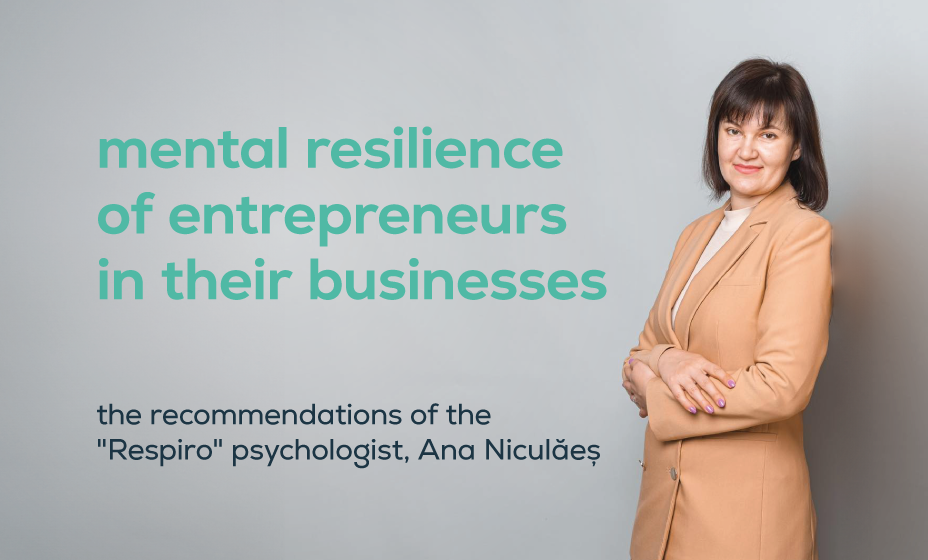In addition to the freedom in management and the aspects that facilitate professional and personal growth that entrepreneurs enjoy, they are often exposed to multiple sources of stress. However, mental health is one of the pillars of wellbeing known to increase productivity and achieve personal goals.
So, it's important to discuss how entrepreneurs can grow their businesses and how they can take care of themselves and manage emotions and stress. Thus, we share some recommendations offered by Ana Niculăeș, psychologist, psychotherapist at consuela.md and co-founder of respiro.md.
Successful entrepreneurs have a heroic status in our culture. An analogy we could use is that of the gladiator fighting a lion. Those around them think, "How brave they are!" and they think, "Why did I get myself into this situation, and what should I do to make sure I make it safely?"
If you run a business, you probably know the feeling. It's a stressful activity that disturbs your emotional wellbeing. There's always something creating psychological tension: unfair competition, conflicts with partners, difficulties managing staff, and pressure to pay employees on time. When the going gets tough, health is most neglected: eating too much or too little, sleep difficulties, not enough time for exercise, and all together trigger emotional vulnerability.
Here are some of the challenges faced by entrepreneurs who have sought psychological counselling:
- Depressive feelings
Working overtime affects wellbeing. The perception that "Time is money" makes entrepreneurs neglect sleep, mealtimes, exercise, and leisure activities, which they perceive as associated with time-wasting. Their resources are depleted, and at some point, their bodies give out. They start to have insomnia, feel irritable, and gain or lose weight. These are symptoms of depression, which many neglect, thinking they are effects of stress.
They may also experience feelings of either physical or emotional isolation and mask their emotional discomfort with more work without realising that they are making their situation worse.
- Discomfort related to self-perception
Some entrepreneurs perceive that self-worth is dictated by net worth. The business is not what they do but who they are. When things are going well, they feel confident. However, when difficulties arise, and they fail to achieve their goals, it becomes a challenge to feel good emotionally. Many are convinced that they will succeed if they put in maximum effort, but the statistical results for business development are often dismal. In a business world where the mantra is: "Failure is not an option!" psychological pressure can cause an emotional crisis.
- High level of anxiety
Many entrepreneurs experience constant anxiety about their business. They find it difficult to relax, take holidays, spend time with friends or family without thinking about their business.
When they are not working, they are always fighting a battle in their minds. They question certain decisions or imagine worst-case scenarios if things don't go according to plan. Constant restlessness can lead to burnout, which is nothing more than 'attitude injury'.
Symptoms of professional burnout include exhaustion, high levels of dissatisfaction, feelings of helplessness and loneliness, low productivity, frequent illnesses, and a crisis of 'meaning'. The causes of burnout are a lack of control over the situation, uncertainty, conflict, overwork, and frustration that things don't go as expected.
- Risk of developing addictions
Entrepreneurs do what they do with great passion, which can sometimes become obsessive. They have a compulsive need to keep going, even at the expense of their health or relationships with loved ones. Sometimes, their need to keep going can cross the line into addiction. Obsessive-compulsive thoughts and cyclical periods of retreat versus high levels of commitment are emotional states very similar to those who are addicted to gambling. Thus, they may be at risk of using alcohol or drugs to numb the emotional discomfort felt, which does not treat the cause, only the symptom, and creates many unwanted side effects.
What could contribute to treatment? Cardiovascular exercise, a balanced diet, getting enough quality sleep, learning constructive coping strategies to deal with stress, and creating an identity separate from the business you are developing. Other aspects of life would do well to be part of their identity. Family, community involvement, gardening, dance classes, musical instruments, whatever suits them, the important thing is owning the sense of success in other domains unrelated to their business.
It is important to have a realistic attitude towards entrepreneurship. Emotional difficulties and mental health problems are not a sign of weakness. It's just a fact that a business owner's lifestyle can reduce resilience and negatively impact the mind.
Be proactive in preventing emotional difficulties. Talk frankly about your emotions, and avoid hiding them. When you deny yourself and your state, others notice. When you are willing to be emotionally open, you can connect much more deeply with the people around you.
Willingness to be vulnerable is a sign of strength for a leader.


 maibank
maibank
 maib business app
maib business app
 internet banking - individuals
internet banking - individuals
 new internet banking - maib business
new internet banking - maib business
 internet Banking - BankFlex
internet Banking - BankFlex




